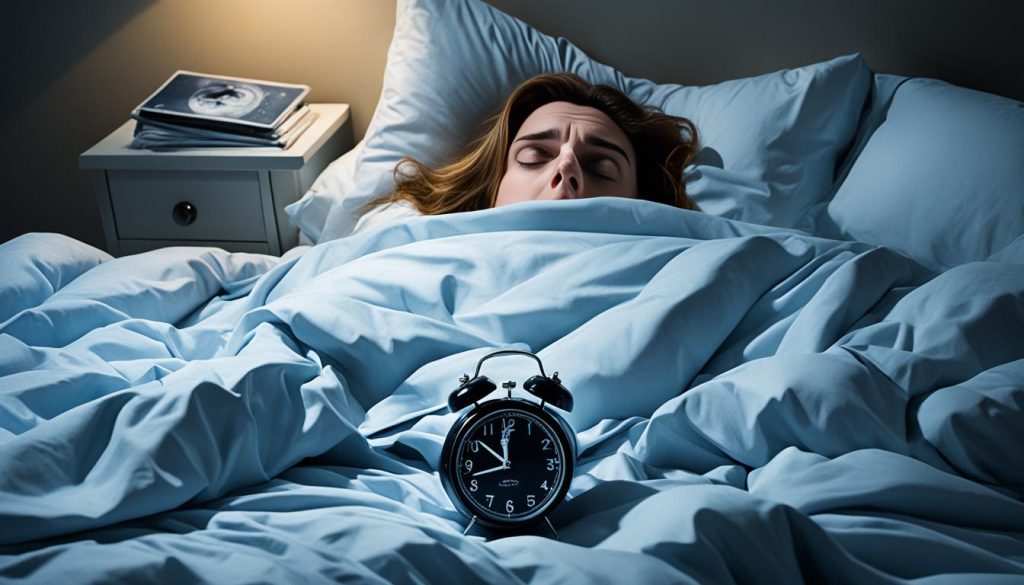Waking up in the middle of the night can be a frustrating experience, leaving you feeling groggy and unable to get the restful sleep you need. While it’s normal to wake up once or twice during the night, frequent awakenings or spending hours awake can be a cause for concern. So why do you wake up in the middle of the night? There are several possible causes to consider.
Issues in your sleep environment, such as uncomfortable bedding or a snoring partner, can disrupt your sleep and lead to sudden awakenings during the night. Consumption of alcohol and caffeine, especially close to bedtime, can also interfere with your sleep cycle, causing you to wake up. Light exposure, stress, hormonal fluctuations, and eating too close to bedtime are other factors that can contribute to waking up in the middle of the night.
Insomnia, obstructive sleep apnea, and other sleep disorders can also be underlying reasons for your midnight awakenings. It’s important to identify the cause of your sleep disruptions so that you can take appropriate steps to address them and enjoy a peaceful, uninterrupted night’s sleep.
In the next sections, we will explore common causes for waking up during the night and provide strategies to help you address this issue. By understanding the reasons behind your nighttime awakenings and implementing practical solutions, you can improve your sleep quality and wake up feeling refreshed and energized. So let’s dive deeper into the possible causes and ways to stop waking up in the middle of the night.
Common Causes for Waking Up During the Night
Waking up in the middle of the night can be a frustrating experience that disrupts your sleep and leaves you feeling groggy the next day. Understanding the common causes for these sudden awakenings can help you find the right solutions to overcome them. Here are some of the most frequent factors that contribute to waking up in the middle of the night:
- Sleep environment: A snoring partner, uncomfortable bedroom temperature, noise, or an unsupportive mattress can all interfere with your sleep and cause regular awakenings.
- Alcohol and caffeine consumption: Stimulants like coffee, tea, and alcohol can disrupt your sleep patterns, making it harder to stay asleep throughout the night.
- Exposure to light: Bright lights before bedtime and during sleep can interfere with your body’s natural sleep-wake cycle, leading to frequent awakenings.
- Stress: Anxiety, work-related pressures, or personal concerns can keep your mind active and prevent you from achieving a restful night’s sleep.
- Eating close to bedtime: Consuming heavy meals or spicy foods too close to bedtime can cause indigestion and discomfort, making it difficult to stay asleep.
- Hormonal fluctuations: Women may experience hormone-related sleep disruptions during different stages of their menstrual cycle, pregnancy, or menopause.
- Insomnia: Chronic insomnia, characterized by difficulty falling asleep or staying asleep, can lead to repeated awakenings in the middle of the night.
- Obstructive sleep apnea: This sleep disorder causes pauses in breathing during sleep, leading to sudden awakenings and disrupted sleep patterns.
- Other sleep disorders: Conditions like blood clot in your leg or restless leg syndrome, periodic limb movement disorder, or REM sleep behavior disorder can contribute to frequent nighttime awakenings.
Identifying the specific cause for your awakening can help you take targeted steps toward better sleep. Let’s explore effective strategies to address these issues in the following section.

How to Address Waking Up in the Middle of the Night?
Experiencing midnight awakenings can be frustrating and disruptive to your sleep patterns. However, there are several strategies you can try to address this issue and improve the quality of your sleep.
Create a Sleep-Friendly Environment
- Keep your bedroom dark by investing in blackout curtains or wearing an eye mask.
- Maintain a cool temperature in your bedroom to promote better sleep.
- Ensure a quiet environment by using earplugs or a white noise machine to mask disruptive sounds.
Manage Alcohol and Caffeine Intake
- Avoid consuming alcohol and caffeine late in the day as they can interfere with your sleep patterns.
Manage Light Exposure
- Avoid exposure to bright lights before bed and during sleep as they can suppress melatonin production and disrupt your sleep-wake cycle.
Manage Stress Levels
- Practice relaxation techniques such as deep breathing, meditation, or yoga before bed to help reduce stress and promote better sleep.
Avoid Eating Too Close to Bedtime
- Avoid eating heavy meals or spicy foods too close to bedtime as they can cause discomfort and disrupt your sleep.
Address Hormonal Imbalances
- If you suspect hormonal imbalances to be the cause of your nocturnal awakenings, consult with a healthcare professional to discuss potential treatment options.
Seek Treatment for Insomnia or Sleep Disorders
- If you suspect you have insomnia or another sleep disorder like obstructive sleep apnea, it’s important to seek medical evaluation and treatment to address the underlying condition.
Make Lifestyle Changes
- Implementing healthy lifestyle habits such as regular exercise, a balanced diet, and a consistent sleep schedule can positively impact your sleep quality.
Remember, finding the right solution may require some experimentation and a personalized approach. It’s essential to find what works best for you and consult with a healthcare professional if your nighttime awakenings persist.

When to Seek Medical Help for Waking Up in the Middle of the Night?
While occasional awakenings during the night are normal, persistent and disruptive waking up in the middle of the night may require medical attention. If your nighttime awakenings significantly impact your ability to function during the day, last for an extended period of time, or are accompanied by other concerning symptoms, it is advisable to speak to a doctor. They can help evaluate potential underlying causes and provide appropriate treatment options to improve your sleep.
If you experience any of the following, it’s important to seek medical help:
- Consistent difficulty falling back asleep after waking up in the middle of the night
- Frequent awakenings that disrupt your sleep pattern
- Severe daytime fatigue or sleepiness
- Loud, chronic snoring or choking/gasping sounds during sleep
- Episodes of sudden cessation of breathing during sleep
- Excessive sweating during sleep
- Frequent nightmares or night terrors
- Unexplained weight gain or difficulty losing weight
Symptoms That Require Medical Help for Waking Up in the Middle of the Night
| Symptom | Description |
|---|---|
| Consistent difficulty falling back asleep after waking up in the middle of the night | Unable to go back to sleep for an extended period of time |
| Frequent awakenings that disrupt your sleep pattern | Waking up multiple times throughout the night, impacting sleep continuity |
| Severe daytime fatigue or sleepiness | Feeling excessively tired or struggling to stay awake during the day |
| Loud, chronic snoring or choking/gasping sounds during sleep | Intense snoring or experiencing breathing difficulties during sleep |
| Episodes of sudden cessation of breathing during sleep | Experiencing pauses in breathing during sleep, known as sleep apnea |
| Excessive sweating during sleep | Waking up drenched in sweat during the night |
| Frequent nightmares or night terrors | Experiencing intense, disturbing dreams or night terrors regularly |
| Unexplained weight gain or difficulty losing weight | Gaining weight without a clear cause or struggling to lose weight despite efforts |
When speaking with a doctor about your nighttime awakenings, be prepared to provide details about your sleep patterns, any known triggers or exacerbating factors, and any other symptoms you may be experiencing. They will likely conduct a thorough evaluation, which may include a review of your medical history, a physical examination, and potentially additional diagnostic tests to determine the underlying cause of your sleep disturbances.
Conclusion
Waking up in the middle of the night can be a frustrating experience, leaving you tired and groggy during the day. Understanding the reasons for these nighttime awakenings and taking proactive steps to address them is crucial for improving your sleep quality and overall well-being.
By identifying potential causes such as sleep environment issues, alcohol and caffeine consumption, stress, and sleep disorders, you can make positive changes to reduce the frequency of waking up in the middle of the night. Creating a sleep-friendly environment, managing light exposure, practicing stress management techniques, and seeking medical help when necessary are all important steps towards achieving restful and rejuvenating sleep.
Remember, prioritizing your sleep and making necessary changes in your lifestyle can lead to long-term improvements in your sleep patterns. Don’t hesitate to reach out to a healthcare professional for guidance and support if you continue to struggle with frequent nighttime awakenings. With a proactive approach and the right strategies, you can regain control over your sleep and wake up feeling refreshed each morning.
FAQ
1. What are the common causes for waking up during the night?
Waking up in the middle of the night can be triggered by various factors. Some common causes include something in your sleep environment, such as a snoring partner or an uncomfortable bedroom, the consumption of alcohol and caffeine, exposure to light before bed and during sleep, stress, eating too close to bedtime, hormonal fluctuations, insomnia, obstructive sleep apnea, and other sleep disorders. Identifying the specific cause for your nighttime awakenings can help you find the appropriate solution.
2. How can I address waking up in the middle of the night?
There are several strategies you can try to address waking up in the middle of the night. These include creating a sleep-friendly environment by keeping your bedroom dark, cool, and quiet, avoiding alcohol and caffeine late in the day, managing your exposure to light before bed and during sleep, managing stress levels, avoiding eating too close to bedtime, addressing hormonal imbalances, seeking treatment for insomnia or sleep disorders like obstructive sleep apnea, and making lifestyle changes to improve your overall sleep quality. It’s important to experiment with different strategies and find what works best for you.
3. When should I seek medical help for waking up in the middle of the night?
While occasional awakenings during the night are normal, persistent and disruptive waking up in the middle of the night may require medical attention. If your nighttime awakenings significantly impact your ability to function during the day, last for an extended period of time, or are accompanied by other concerning symptoms, it is advisable to speak to a doctor. They can help evaluate potential underlying causes and provide appropriate treatment options to improve your sleep.





